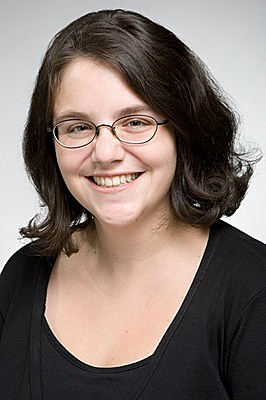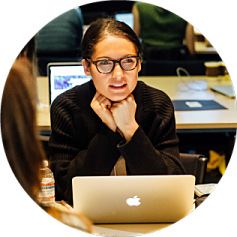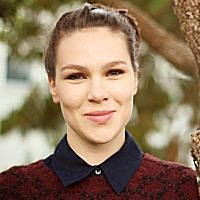Scientists conducting the Citizen Endo research project at Columbia University Medical Center in New York City note that to study a disease, it is necessary to know what it looks like. With endometriosis, researchers say there are many ways the disease can present in patients, but there’s a disconnect between how doctors think about the disease and what patients actually experience on a daily basis.
Bridging this gap is critical to advancing research on endometriosis, according to Citizen Endo researchers, who are conducting a series of studies to better understand the disease from a patient’s perspective.
One of those studies includes designing Phendo, a mobile app expected to be ready for download this fall. Phendo’s main goal is to empower women with endometriosis by helping them track their symptoms, treatments, and for some, instances of infertility.
The Citizen Endo team — academic researchers who make tools like mobile apps to collect health data, explore it, and generate meaningful insights — say they need patients’ help to make this project a success. They want to engage patients as active participants in their research to establish a comprehensive description of the disease through patient-generated health data. They will also try to help patients make sense of the data they generate.
Past and ongoing Citizen Endo research studies include:
- Self-Tracking Among Women With Endometriosis (completed): This was a series of focus groups with women officially diagnosed with endometriosis, conducted and completed in February 2016.
- Phendo Self-Tracking Variables (June 2016-Present, open): This online survey is open to women officially diagnosed with endometriosis.
- Designing Phendo (June 2016-Present, open): This card-sorting activity is open to women officially diagnosed with endometriosis. Online or face-to-face interviews that take place in Manhattan and last about one hour are required.
- Phendo Prototype Testing (July 2016-Present, open): Involves in-person interviews in Manhattan lasting about one hour to assess a self-tracking app prototype; open to women officially diagnosed with endometriosis.
For more information about participating, visit:
http://citizenendo.org
The Citizen Endo team designing the Phendo mobile app say that patient input will help them determine the specific items to include and prioritize in the software. The researchers are looking for women who have been diagnosed with endometriosis through surgery and have experienced endometriosis-related symptoms in the last three months. The online Citizen Endo Mobile App Survey 1 is anonymous, and should take less than 10 minutes to complete.
 Principal investigator of the Citizen Endo project is Noémie Elhadad, an associate professor in biomedical informatics and the Health Analytics Chair at Columbia University. Elhadad, who was diagnosed with endometriosis at age 13, describes her research as being “at the intersection of data science and medicine,” using biomedical informatics and data mining to develop techniques to support clinicians, patients, and researchers optimize their workflow by automatically retrieving information from unstructured, large clinical datasets, such as electronic patient records and patient platforms like online health communities and forums.
Principal investigator of the Citizen Endo project is Noémie Elhadad, an associate professor in biomedical informatics and the Health Analytics Chair at Columbia University. Elhadad, who was diagnosed with endometriosis at age 13, describes her research as being “at the intersection of data science and medicine,” using biomedical informatics and data mining to develop techniques to support clinicians, patients, and researchers optimize their workflow by automatically retrieving information from unstructured, large clinical datasets, such as electronic patient records and patient platforms like online health communities and forums.
She explains that her research relies on two methods: the design of novel computational approaches that infer health phenomena models and account for specific biases of large health data, and translation of models into actionable knowledge and systems within the healthcare system — for example, a patient record summary system for clinicians.
 Elhadad’s research colleague Mollie McKillop, MPH, MA, is a PhD student in the Columbia University Department of Biomedical Informatics and also a Big Data to Knowledge (BD2K) trainee currently working to better understand endometriosis, particularly from the patient and epidemiological perspective.
Elhadad’s research colleague Mollie McKillop, MPH, MA, is a PhD student in the Columbia University Department of Biomedical Informatics and also a Big Data to Knowledge (BD2K) trainee currently working to better understand endometriosis, particularly from the patient and epidemiological perspective.
She says the Phendo app the team is designing will collect patient-reported symptoms and related factors by applying user-centered design principles, and that data collected from the app will be analyzed using data science methods to generate meaningful insights about endometriosis, and to phenotype women with the disease.
 Citizen Endo Project Coordinator Sylvia English, MS, is a research project manager in Biomedical Informatics at Columbia University whose main focus is on solving problems at the cross-section of science, technology, and society with a focus on reproductive health.
Citizen Endo Project Coordinator Sylvia English, MS, is a research project manager in Biomedical Informatics at Columbia University whose main focus is on solving problems at the cross-section of science, technology, and society with a focus on reproductive health.
Citing Endometriosis Foundation of America metrics, Elhadad and her team note that endometriosis, a severe and often debilitating disease, is estimated to affect approximately 1 in 10 women globally in their reproductive years. They note it is a widely misunderstood disorder in all its stages, ranging from its etiology and mechanisms of progression, to treatment options and prognosis.
The investigators say their objective in developing the Phendo mobile app is to enable patients to track their experience of endometriosis, which will serve the researchers by establishing a catalog of signs and symptoms experienced by patients; and identify symptoms and patient characteristics that form meaningful clusters indicative of disease subtypes.
They suggest that because endometriosis is so widely misunderstood, sources traditionally used for disease phenotyping, such as electronic health records, do not contain adequate documentation of endometriosis signs and symptoms. The scientists said that patients experiencing the disease first-hand can provide their own experience of the ways in which endometriosis manifests, providing researchers with elements to consider in developing a phenotype description of endometriosis.

